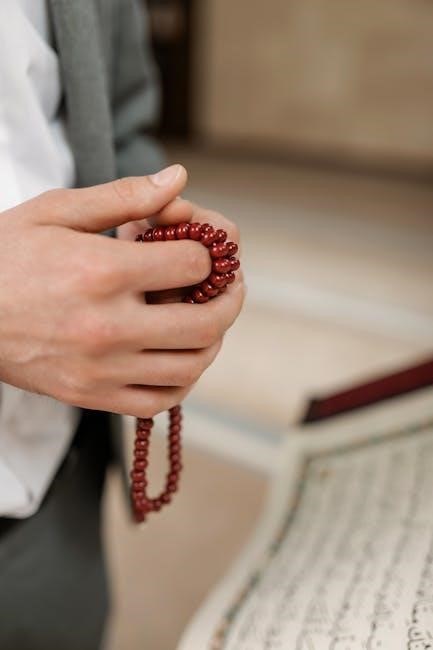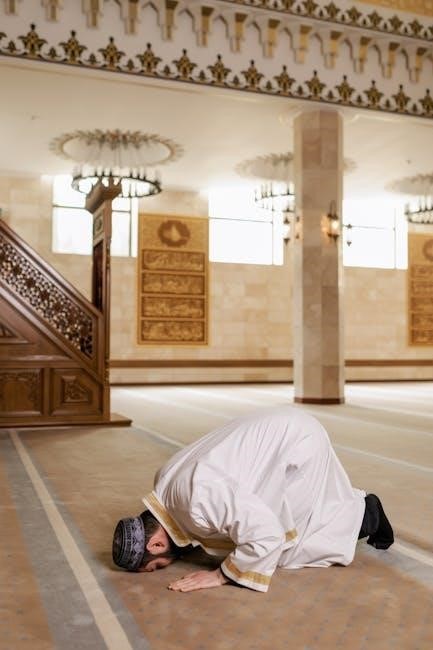Dua after Salah is a sacred act of communication with Allah, allowing believers to express gratitude, seek forgiveness, and make heartfelt supplications. It strengthens the spiritual bond and is a Sunnah practice encouraged in Islam, fostering a deeper connection with the Divine through sincere and meaningful invocations.
Significance of Dua After Salah
Dua after Salah holds immense spiritual significance, serving as a direct communication with Allah. It is a Sunnah practice that strengthens one’s faith and connection with the Divine. Through these supplications, believers express gratitude, seek forgiveness, and present their needs to Allah. The act of raising hands and reciting specific duas fosters humility and sincerity. It is a powerful means to seek guidance, protection, and blessings. Regularly practicing dua after Salah cultivates a deeper sense of spirituality and mindfulness, while also reinforcing the teachings of Islam. This practice is simple yet profound, making it accessible to all while offering immense spiritual rewards.

Authentic Dua After Salah
Authentic duas after Salah are specific supplications recommended after each obligatory prayer, based on the Prophet Muhammad’s (peace be upon him) teachings, ensuring spiritual connection and divine blessings.
3.1. Dua 1: Istighfar
Istighfar, seeking forgiveness, is a fundamental Dua after Salah. The Prophet Muhammad (peace be upon him) taught to recite it three times: أَسْتَغْفِرُ اللَّهَ (Astaghfirullah). This act humbles the heart, seeking Allah’s mercy and pardon for sins. Consistent Istighfar strengthens faith, cleanses the soul, and is a Sunnah practice. It reflects a believer’s commitment to spiritual growth and divine connection. Regularly practicing Istighfar fosters self-reflection and gratitude, aligning one’s life with Islamic values. This Dua is simple yet profound, making it accessible for all to seek Allah’s forgiveness and blessings after every prayer. Its repetition fosters a mindset of humility and devotion, essential for a believer’s spiritual journey.
3.2. Dua 2: Allahu Akbar
Reciting Allahu Akbar after Salah is a powerful Sunnah practice. It is recommended to say it three times, particularly after Fajr and Maghrib prayers. This declaration of Allah’s greatness strengthens faith and humility. The Prophet Muhammad (peace be upon him) emphasized its importance, as it reflects a believer’s acknowledgment of Allah’s supremacy. Regularly reciting Allahu Akbar fosters a deeper spiritual connection and reminds one of Allah’s magnificence. It is a simple yet meaningful act that reinforces devotion and gratitude, aligning the heart with Islamic values. This Dua is a cornerstone of post-Salah supplications, nurturing a sense of awe and reverence for the Almighty.
3.3. Dua 3: Subhanallah
Reciting Subhanallah (Glory be to Allah) after Salah is a beautiful act of glorification. It is Sunnah to say it 33 times after each prayer, along with Alhamdulillah (33 times) and Allahu Akbar (once). This practice, taught by the Prophet Muhammad (peace be upon him), helps maintain a strong spiritual connection. Subhanallah expresses awe of Allah’s perfection and reminds believers of His infinite greatness. Regularly reciting it fosters humility, gratitude, and a deeper appreciation for divine blessings. It is particularly recommended after Fajr and Maghrib prayers, where it is recited three times. This Dua is simple yet profound, reinforcing faith and devotion in daily worship.
3.4. Dua 4: La Ilaha Illallah
Reciting La Ilaha Illallah (There is no deity but Allah) after Salah is a profound declaration of faith. It is part of the Shahada, the Islamic declaration of belief, and a cornerstone of Islam. Reciting it after prayers strengthens one’s belief in Allah’s oneness and reinforces the foundation of worship. The Prophet Muhammad (peace be upon him) emphasized its importance, and it is recommended to recite it after each prayer, especially after Fajr and Maghrib. This Dua serves as a reminder of Allah’s sovereignty and unity, helping believers stay focused on their ultimate purpose. Regular recitation fosters a deeper connection to faith and protects against distractions from worldly desires.
3.5. Dua 5: Dhikr and Tasbeeh
Engaging in Dhikr and Tasbeeh after Salah is a blessed practice that involves glorifying Allah through specific phrases. Reciting Subhanallah (Glory be to Allah), Alhamdulillah (Praise be to Allah), and Allahu Akbar (Allah is the Greatest) is highly recommended. These acts of remembrance strengthen one’s spiritual connection and express gratitude for Allah’s blessings. The Prophet Muhammad (peace be upon him) taught that reciting these phrases, especially in multiples of 33, 33, and 34 respectively, is a Sunnah practice. Tasbeeh beads (Misbaha) are often used to keep count. This Dua fosters mindfulness, humility, and a deeper appreciation for Allah’s mercy, making it a beautiful way to conclude prayers and seek divine forgiveness.
How to Perform Dua After Salah
To perform Dua after Salah, one should first ensure a clean and focused state of mind. Raise your hands to chest level, palms facing towards your face, and recite the supplications with sincerity and concentration. It is recommended to start with Istighfar (seeking forgiveness) and then proceed to other supplications like Subhanallah and Allahu Akbar. Maintain humility and gratitude while making your requests to Allah. The Prophet Muhammad (peace be upon him) emphasized the importance of raising hands and being mindful during Dua. Using authentic Dua after Salah PDFs can guide you in reciting the correct and recommended supplications, ensuring your Dua is performed in accordance with Islamic teachings.
Benefits of Reciting Dua After Salah
Reciting Dua after Salah offers numerous spiritual and emotional benefits. It strengthens one’s connection with Allah, allowing believers to express gratitude, seek forgiveness, and make heartfelt supplications. Dua after Salah is a Sunnah practice that deepens the spiritual bond and fosters a sense of humility and mindfulness. It provides an opportunity to reflect on one’s actions, seek guidance, and request protection from harm. Regularly performing Dua after Salah also cultivates a habit of consistent communication with Allah, enhancing overall faith and devotion. By incorporating these supplications, individuals can experience inner peace, spiritual growth, and a stronger sense of purpose in their daily lives.

Common Mistakes to Avoid
When reciting Dua after Salah, it is essential to avoid common mistakes that may diminish its impact. One of the most frequent errors is rushing through the supplications without focus or sincerity. Another mistake is neglecting to face the Qiblah or maintaining improper etiquette while reciting. Some individuals may skip the recommended Sunnah supplications altogether, opting for informal or unverified duas. Additionally, others may recite the duas in a loud or disruptive manner, disturbing others nearby. It is also important to avoid mixing personal supplications with the authentic, prescribed ones without proper understanding. Finally, some people may abandon the practice altogether, missing out on its spiritual benefits. Avoiding these errors ensures a more meaningful and effective Dua experience.

Dua After Salah PDFs provide a structured format for reciting authentic supplications post-prayer, ensuring ease of access and adherence to Islamic traditions. They compile essential duas, aiding believers in maintaining consistency and correctness during their spiritual practice.
7.1. Importance of PDF Resources
Dua After Salah PDF resources are invaluable for believers seeking structured guidance in their spiritual practice. These documents compile authentic supplications, ensuring accuracy and ease of access. They often include Arabic texts, translations, and meanings, fostering a deeper understanding of the prayers. PDFs are conveniently shareable and printable, making them ideal for personal or communal use. Many resources are formatted for different paper sizes, enhancing readability and portability. By providing a centralized source of verified duas, these PDFs help maintain consistency and correctness in worship. They also serve as a timeless reference, preserving sacred knowledge for future generations and facilitating a stronger connection with Allah.
7.2. Recommended Resources
Several trusted websites offer authentic Dua After Salah PDF resources, ensuring accessibility and accuracy. Platforms like duas.org and islam.global provide comprehensive guides with Arabic texts, translations, and meanings. These resources are meticulously formatted, often available in multiple sizes (A4, A3, A5), making them ideal for printing and sharing. Many PDFs include verified supplications from Islamic scholars, ensuring their authenticity. Websites such as Google Drive and Scribd also host reliable versions, enabling easy downloads. These resources are invaluable for believers seeking to enhance their spiritual practices with accurate and meaningful supplications after Salah.
Dua after Salah is a profound Sunnah that strengthens one’s connection with Allah. By reciting authentic supplications, believers express gratitude, seek forgiveness, and make heartfelt requests. The availability of PDF resources simplifies access to these supplications, ensuring accuracy and convenience. These resources often include Arabic texts, translations, and meanings, making them accessible to all. Regularly practicing Dua after Salah fosters spiritual growth and enhances the quality of worship. Embracing this practice with sincerity and consistency is highly encouraged, as it aligns with the teachings of Islam and enriches one’s relationship with the Divine.

Final Thoughts
Embracing Dua after Salah enriches one’s spiritual journey, fostering a deeper connection with Allah. The availability of PDF resources ensures easy access to authentic supplications, enabling believers to practice with confidence. These resources often include Arabic texts, translations, and meanings, making them accessible to all. Regularly incorporating Dua after Salah strengthens faith, promotes gratitude, and invites divine blessings. It is a powerful way to seek forgiveness, express thanks, and make heartfelt requests. By prioritizing this practice, individuals can enhance their worship and cultivate a more meaningful relationship with Allah. Consistency and sincerity in performing Dua after Salah are key to reaping its spiritual rewards and experiencing personal growth.
References
Several credible sources provide comprehensive insights into Dua after Salah, including authentic supplications and their significance. The “Dua After Salah ⎻ Free PDF Download” offers a detailed guide to post-prayer supplications, while “Authentic Duas from Sahih Al-Bukhari” highlights duas validated by scholarly traditions. Additionally, “Islamic Supplications ⎻ DuaHub” serves as a valuable resource for learning and reciting these prayers. Official websites like duas.org and islam.global are reliable platforms for accessing PDF materials and understanding the proper etiquette of Dua after Salah. These references ensure a well-rounded understanding of the practice and its spiritual benefits.

